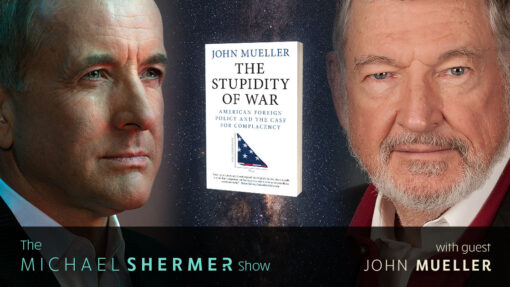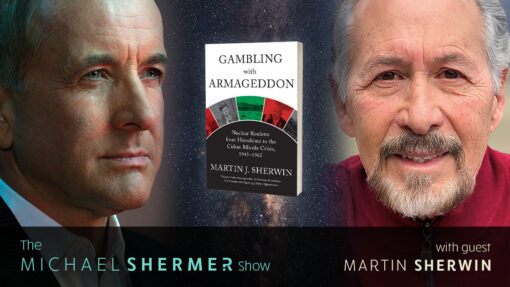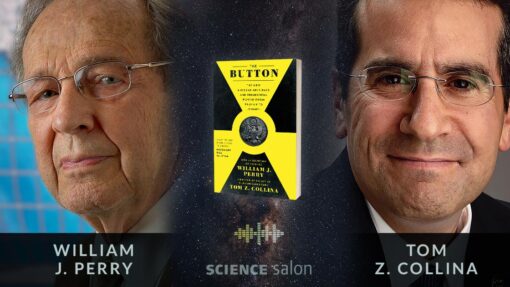nuclear deterrence

Shermer and Jacobsen discuss: why we have a nuclear triad • competition among military forces • increasing budgets for more weapons • types and quantities of nuclear weapons • why humans engage in aggression, violence, and war • The Prisoner’s dilemma, Hobbesian trap, Security Dilemma, the “other guy” problem • Balance of Terror, Mutual Assured Destruction, Logic of Deterrence • close calls • surviving a nuclear explosion • what happens in a nuclear bomb explosion • consequences of a nuclear…
In episode 171 of Michael Shermer’s podcast he speaks with political scientist John Mueller about his new book The Stupidity of War: American Foreign Policy and the Case for Complacency.

Political scientist John Mueller argues that American foreign policy since 1945 has been one long miscue; most international threats — including during the Cold War — have been substantially exaggerated. Dr. John Mueller is a political scientist at Ohio State University, Senior Fellow at the Cato Institute, and member of the American Academy of Arts and Sciences.

In episode 155 of The Michael Shermer Show, Dr. Shermer speaks with Martin Sherwin, the Pulitzer Prize-winning author of American Prometheus: The Triumph and Tragedy of J. Robert Oppenheimer, about his new book Gambling with Armageddon, the definitive history of the Cuban Missile Crisis and its potential for nuclear holocaust, in a wider historical narrative of the Cold War — how such a crisis arose, and why at the very last possible moment it didn‘t happen.
In episode 155 of The Michael Shermer Show, Dr. Shermer speaks with Martin Sherwin, the Pulitzer Prize-winning author of American Prometheus: The Triumph and Tragedy of J. Robert Oppenheimer, about his new book Gambling with Armageddon, the definitive history of the Cuban Missile Crisis and its potential for nuclear holocaust, in a wider historical narrative of the Cold War — how such a crisis arose, and why at the very last possible moment it didn‘t happen.

On the 75th anniversary of nuclear weapons, Dr. Michael Shermer presents a moral case for their use in ending WWII and the deterrence of Great Power wars since, and a call to eventually eliminate them.
In SPAS-005, the researchers asked, “Do attitudes about language differ by political party affiliation?” PLUS: On the 75th anniversary of nuclear weapons, Dr. Michael Shermer presents a moral case for their use in ending WWII and the deterrence of Great Power wars since, and a call to eventually eliminate them.

In Science Salon # 127, Michael Shermer speaks with William J. Perry, Secretary of Defense in the Clinton administration and Tom Z. Collina, the Director of Policy at Ploughshares Fund, a global security foundation in Washington, DC, as they share their firsthand experience on the front lines of the nation’s nuclear history.
In Science Salon # 127, Michael Shermer speaks with William J. Perry, Secretary of Defense in the Clinton administration and Tom Z. Collina, the Director of Policy at Ploughshares Fund, a global security foundation in Washington, DC, as they share their firsthand experience on the front lines of the nation’s nuclear history.

In this, the final lecture of his Chapman University Skepticism 101 course, Dr. Michael Shermer pulls back to take a bigger picture look at what science and reason have done for humanity in the realm of moral progress. Watch The Moral Arc: How Thinking Like a Scientist Makes the World More Moral.
In this, the final lecture of his Chapman University Skepticism 101 course, Dr. Michael Shermer pulls back to take a bigger picture look at what science and reason have done for humanity in the realm of moral progress. Watch The Moral Arc: How Thinking Like a Scientist Makes the World More Moral.
Humans have long seen ourselves as the center of the universe. This viewpoint — a persistent paradigm of our own unique self-importance — is as dangerous as it is false. In this Science Salon with Michael Shermer based on his new book Through a Glass Brightly noted biologist and evolutionary psychologist David Barash explores the process by which science has, throughout time, cut humanity “down to size,” and how humanity has responded.

Humans have long seen ourselves as the center of the universe. This viewpoint — a persistent paradigm of our own unique self-importance — is as dangerous as it is false. In this Science Salon with Michael Shermer based on his new book Through a Glass Brightly noted biologist and evolutionary psychologist David Barash explores the process by which science has, throughout time, cut humanity “down to size,” and how humanity has responded.

There are skeletons in the closet of nuclear deterrence. Advocates of nuclear deterrence say nuclear weapons are not only justified, their existence seems to have worked, and to be working, right now. In this week’s eSkeptic, David Barash avers that skepticism of nuclear deterrence is long overdue.

There are skeletons in the closet of nuclear deterrence. Advocates of nuclear deterrence say nuclear weapons are not only justified, their existence seems to have worked, and to be working, right now. David Barash avers that skepticism of nuclear deterrence is long overdue.
In this week’s eSkeptic: The latest issue of Skeptic magazine (19.2): Boston Bombing Conspiracy Theories; Shermer asks whether deterrence prohibits the total abolishment of nuclear weapons; MonsterTalk discusses the legends and facts behind the Mongolian Death Worm; and Loxton reflects on monster hoaxes—and Discovery Channel’s tarnished reputation.
















